
About UsThe Numismatic Bibliomania Society is a non-profit organization devoted to the study and enjoyment of numismatic literature. For more information please see our web site at coinbooks.org SubscriptionsThose wishing to become new E-Sylum subscribers (or wishing to Unsubscribe) can go to the following web page link MembershipThere is a membership application available on the web site Membership Application To join, print the application and return it with your check to the address printed on the application. Membership is only $20 to addresses in the U.S., $25 for First Class mail, and $30 elsewhere. For those without web access, write to: David M. Sundman, Treasurer
AsylumFor Asylum mailing address changes and other membership questions, contact David at this email address: dsundman@LittletonCoin.com SubmissionsTo submit items for publication in The E-Sylum, just Reply to this message, or write to the Editor at this address: whomren@gmail.com BUY THE BOOK BEFORE THE COINSale Calendar |
- WAYNE'S WORDS: THE E-SYLUM JUNE 21, 2015
- LAKE BOOKS SALE #122 CATALOG AVAILABLE
- NEW BOOK: KUSHAN, KUSHANO-SASANIAN, AND KIDARITE COINS
- NEW BOOK: THE COINS AND MEDALS OF MERSEBURG
- NEW BOOK: SAMPLE SLABS
- WHITMAN 'SHARE YOUR HOBBY' CONTEST DEADLINE JULY 4, 2015
- JOHN BURNS MEMORIAL REFERENCE LIBRARY AT 2015 ANA
- COIN BOARD NEWS NUMBER 35 PUBLISHED
- NOTES FROM E-SYLUM READERS: JUNE 21, 2015
- 2015 CSNS SYMPOSIUM SPEAKERS ANNOUNCED
- A WOMAN'S PORTRAIT PLANNED FOR U.S. $10 BILL
- SEVERAL WOMEN TOUTED FOR $10 BILL
- TIME CAPSULE RETURNED TO MASSACHUSETTS STATEHOUSE
- MORE SELECTIONS FROM NUMISMATIC AUCTIONS SALE #57
- QUERY: ENGLISH LANGUAGE NUMISMATIC DICTIONARY HELP SOUGHT
- THE GEORGE G. EVANS GIFT BOOK STORE
- DRESDEN COIN CABINET REOPENS
- NUMISMATICS IN COPENHAGEN MUSEUMS
- THE FORTS VISIT SCOTLAND'S NUMISMATIC MUSEUMS
- 1890'S BANK OF ENGLAND FIVE POUND BANKNOTE IMAGES SOUGHT
- THE 1973 SERIES A AND B COINS OF GREECE
- MORE FAMOUS NAMES ON OBSOLETE BANKNOTES
- THE WILDCAT BANK OF TINKERVILLE
- QUERY: GEORGIA CIVIL WAR OVERPRINTED SCRIP NOTES
- CIA INFORMATION OPERATIONS CENTER MEDAL
- SOME MORE SELECTIONS FROM PRESIDENTIAL AUCTION #85
- ANCIENT COIN MOLDS FOUND IN NORTH CHINA
- COINS IN DON QUIXOTE
- MEDIEVAL COIN HOARD DISCOVERED IN WALES
- ARCHAEOLOGISTS FIND EDWARD I HAMMERED HALFPENNY
- THE ELUSIVE UNTOUCHED ROMAN BRONZE COINS
- DETROIT DOCTOR COULD FORFEIT $MILLION COIN TROVE
- FEATURED WEB SITE: FRENCH TOKEN COLLECTORS ASSOCIATION
Click here to access the complete archive
To comment or submit articles, reply to whomren@gmail.com
WAYNE'S WORDS: THE E-SYLUM JUNE 21, 2015

New subscribers this week include: Gary Beals and James Mayer. Welcome aboard! We now have 1,848 subscribers.
Your Editor will be on the road the next two weekends, traveling for a family vacation. As a result, the upcoming issues may be abbreviated or late. But keep your email submissions coming in the meantime, and thanks for your patience.
This week we open with a note from numismatic literature dealer Fred Lake, three new books, and updates on the Whitman photo contest and the John Burns traveling numismatic library.
Other topics include the planned woman's portrait for the $10 bill, the Massachusetts Statehouse time capsule, numismatic museums in Dresden, Copenhagen and Scotland, famous names on obsolete banknotes, a CIA medal, and coins in Don Quixote.
To learn more about Kushan coinage, sample slab collecting, the George G. Evans Gift Book Store, J.L. Berch and the runaway slave girl, Napoleon Bounaparte banknotes and the Wildcat Bank of Tinkerville, read on. Have a great week, and Happy Father's Day, Dads!
Wayne Homren
Editor, The E-Sylum
LAKE BOOKS SALE #122 CATALOG AVAILABLE
Lake Books announces that its 122nd mail-bid sale of numismatic literature is now available for viewing on their web site at http://www.lakebooks.com/current.html The 460-lot sale contains reference material from the library of Maj. C. H. “Rusty” Schroeder and other consignors. Ancient Greek and Roman coinage is covered in long runs of books such as the BMC editions and the RIC books. United States catalogs are featured with sets that showcase the holdings of Nelson and William Hunt. In addition, you will find valuable information relating to Paper Money, Tokens & Medals, U. S. numismatic literature dealers, and a number of books that cover Exonumia.
The sale has a closing date and time of Tuesday, July 21, 2015 at 5:00 PM and bids may be placed via email, fax, telephone or US Mail until that time.
Good Luck with your bidding, Fred
Lake Books
6822 22nd Ave N
St. Petersburg, FL 33710-3918
727-343-8055 fax: 727-381-6822
NEW BOOK: KUSHAN, KUSHANO-SASANIAN, AND KIDARITE COINS
New Kushan Publication Available from The American Numismatic Society
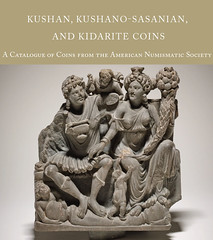 A long-awaited publication from The American Numismatic Society (ANS), Kushan,
Kushano-Sasanian, and Kidarite Coins, is now available for sale. The 322-page hardcover catalogue with 79 full-color plates, a work by
David Jongeward and Joe Cribb with Peter Donovan, presents all of the Kushan coins in the ANS collection and provides detailed
descriptions, selected illustrations, and commentary, which represents four centuries of Central and South Asian ancient history.
A long-awaited publication from The American Numismatic Society (ANS), Kushan,
Kushano-Sasanian, and Kidarite Coins, is now available for sale. The 322-page hardcover catalogue with 79 full-color plates, a work by
David Jongeward and Joe Cribb with Peter Donovan, presents all of the Kushan coins in the ANS collection and provides detailed
descriptions, selected illustrations, and commentary, which represents four centuries of Central and South Asian ancient history.
Differing from previous publications, there have been major revisions to the organization and chronology of the production system of Kushan coinage. This catalogue is based on the latest coin-based research, including site find analysis and die studies. Essays in the introduction present the historical and cultural context of the kings and their coins, with the coins classified by ruler, metal, denomination, mint, production phase, type and variety.
This catalogue features two series of coins issued by the Kushano-Sasanian and the Kidarite Hun rulers of former Kushan territory as they adapted and followed the Kushan coinage system. It also contains illustrations of all the ANS gold coins and a selection of copper coins.
Andrew Reinhard, Director of Publications, commented on this newest title available from the ANS, “With a very strong cabinet of Far Eastern issues, we at the ANS were excited to produce material on our Central and South Asian coinage. This catalogue is an incredible tool for academics, numismatists, and collectors, as it will assist in identifying coins and with the general understanding of this significant historical period.”
Kushan, Kushano-Sasanian, and Kidarite Coins is available to order on the ANS website, http://numismatics.org/Store/Kushans, or you can call Catherine DiTuri to place your order at 212-571-4470, ext. 117. The list price is $150; ANS members may purchase it for $105.
To read the complete article, see:
New Kushan Publication Available from The American Numismatic Society
(http://numismatics.org/NewsEvents/KushanKushano)
NEW BOOK: THE COINS AND MEDALS OF MERSEBURG
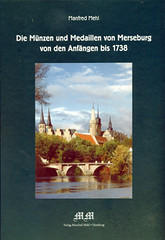 Manfred Mehl
Manfred Mehl
Die Münzen und Medaillen von Merseburg von den Anfängen bis 1738.
Verlag Manfred Mehl,
Hamburg, 2015.
250 pages with illustrations in color and black and white.
21.8 x 30.3 cm. Hardcover.
ISBN: 978-3-933420-04-0.
50 euros.
Once again, Manfred Mehl presents a new, exemplary corpus that brings together everything a numismatist can access: the material, the archival records, and the hoard finds. This time, the subject-matter is Merseburg, the important cathedral city on the Saale River that became an imperial palace as early as the 10th century. In 980, the city was granted the minting privilege by Otto II for the first time.
The first coins we can surely identify, however, date to the years between 1009 and 1018. Magnificent bracteates were manufactured in Merseburg before the production of coins was brought to a temporary halt around 1300. Yet Merseburg exerted his right to mint coins from time to time: in the 14th century when it produced bracteates, for example, or – being in good company with many others who remembered that they still possessed the minting privilege granted long ago – during the Kipper and Wipper Period.
Manfred Mehl is presenting the material with due attention to detail. He has written a type catalog that is the perfect tool to identify coins with. His book is much more though.
It starts with the history of research and goes on to tell the history of the Bishopric of Merseburg. Outclassing even the most comprehensive internet lexicon, Manfred Mehl examines the primary sources and the relevant literature. A documentation of all coin finds in the Merseburg region and an excursus on accounting in Merseburg are next. That is quite beneficial for those who still think of the pound as a unit of weight and the mark as a denomination. Better than any list of hoards, this itemization provides an insight into the different means of payment in Merseburg back then. In an exemplary manner, this chapter illustrates how much historical knowledge is still hidden in the archives.
The central part of book comes next, the catalog of the medieval coinage of Merseburg. A summary of the coinage and a list of all hoards containing coins made in Merseburg are followed up by the catalog, arranged according to the different bishops. A biography is provided for every bishop, even for those in whose era no coins had actually been minted. The coins struck under a particular bishop are next, with photographs including a drawing, if necessary, and a detailed description, a list of finds of which the particular piece has been part of, and a list of collections that includes the type of coin. Another chapter deals with coins whose attribution to Merseburg is questionable.
To read the complete article, see:
Merseburg: A New Corpus Presented by Manfred Mehl
(www.coinsweekly.com/en/News/4?&id=3492)
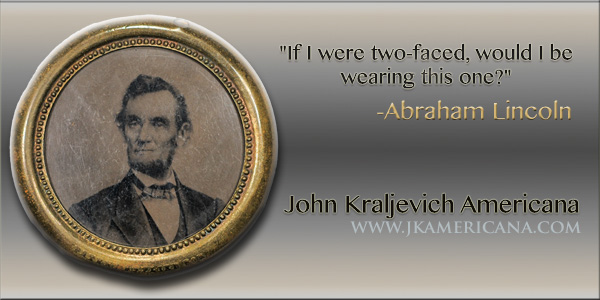
NEW BOOK: SAMPLE SLABS
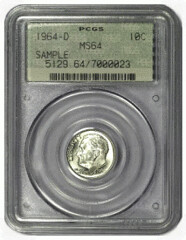 Sample slab collecting, a formerly obscure numismatic niche, is about to move to the edge of the mainstream with the publication of the
first book on the subject on September 17, 2015.
Sample slab collecting, a formerly obscure numismatic niche, is about to move to the edge of the mainstream with the publication of the
first book on the subject on September 17, 2015.
When third-party grading services began encapsulating coins in 1986, they often gave away samples of their new coin holders. Originally distributed free to collectors, these sample slabs have an active secondary market, with many desirable varieties commanding $100 – $300.
Although, like vintage coin boards and coin albums, samples have become collectibles in their own right, the field had no comprehensive catalog and value guide.
Sample Slabs by COINage columnist and The Numismatist contributor David Schwager, which covers 580 types from 32 grading services, fills that gap. Like other seminal works, from Lyman Low’s Hard Times Tokens in the 19th century to Charlie Rogers’ A History of Disney Dollars in the 21st, Sample Slabs has the potential to define, organize, and energize the field.
More details and a 70-page sample chapter are available at SampleSlabBook.com .
To read the complete article, see:
Sample Slab
Market about to Expand with Publication of First Catalog
(www.coinweek.com/education/coin-grading/sample-slab-market-about-to-expand-with-publication-of-first-catalog/)
WHITMAN 'SHARE YOUR HOBBY' CONTEST DEADLINE JULY 4, 2015
The deadline for Whitman Publishing’s numismatic photography contest is approaching: July 4, 2015. Prizes are worth up to $500 in retail value. The Whitman “Share Your Hobby” Photo Contest, for human-interest views of coin and paper-money collecting, is open to all photographers 18 and older. Entries will be judged by Whitman Publishing staff, Numismatic Director Q. David Bowers, and Red Book Senior Editor Kenneth Bressett. All submissions are eligible to be included in future Whitman books, and winners will be publicized at the American Numismatic Association World’s Fair of Money in Chicago, August 2015.
“Numismatics is about more than just accumulating round pieces of metal,” says Whitman publisher Dennis Tucker. “We’re looking for images of people enjoying their pursuit of the hobby. They might show grandparents with their grandchildren, collectors studying or displaying their coins and paper money, friends examining new purchases, or a hobbyist talking and laughing with a favorite coin dealer. The setting could be your den or home office, a coin show, a presentation at your local club, or the comfortable chair where you relax to read books. The only limits are your imagination and creativity.”
Entries may be old photographs or new.
Prizes are as follows:
First prize: $500 retail shopping at Whitman.com
Second prize: $250 retail shopping at Whitman.com
Third prize: $100 retail shopping at Whitman.com
(10) runner-up prizes: A copy of the new 1,504-page Guide Book of United States Coins, Deluxe Edition ($49.95 retail value)
Digital entries: Should be at least 6 megapixels. May be emailed to ShareYourHobby@whitman.com.
Print entries: Should be mailed to Whitman Publishing, Attn: Share Your Hobby Contest, 3101 Clairmont Road, Suite G, Atlanta GA 30329.
All entries: Include your name, mailing address, phone number, and email address. By entering the contest you grant permission for your photograph to be published by Whitman Publishing. A standard model-release form must be signed for any photographs showing people. The permission form and full contest rules are available at www.Whitman.com/ShareYourHobby .
JOHN BURNS MEMORIAL REFERENCE LIBRARY AT 2015 ANA
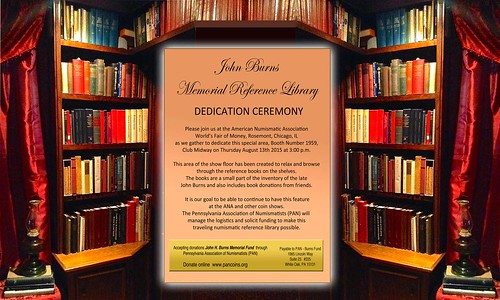
The John Burns Memorial Reference Library will have its traveling debut at the American Numismatic Association’s World’s Fair of Money in Rosemont, Chicago, Illinois on August 11-15, 2015. It has been produced as a result of the remaining money in the John Burns Memorial Fund that was created upon the unexpected passing of the well-known numismatic book dealer on January 11th 2014.
The purpose of the library is to provide a welcome area to relax and browse through the numismatic reference books on the shelves. The books are part of John’s inventory along with additional book donations from friends and colleagues.
Coin show attendees are welcome to use the books but are not permitted to take them off the show floor. All the borrowed books must be returned to the shelves before exiting the coin show. The library has been set up as a test run at the last two PAN coin shows and proved to be very popular with collectors, dealers, and exhibit judges. The Burns library will be transported to the World’s Fair of Money to be set up at booth location #1959 on ANA show floor.
A dedication ceremony will take place at the library booth location on Thursday August 13th at 3:00pm. The invitation is open to anyone with interest. PAN is also in need of continued financial support and book donations to build this innovative new coin show feature. The goal is to garner monies through the John Burns Memorial Fund so that it can continue as a regular component at future ANA shows and other major and minor coin shows.
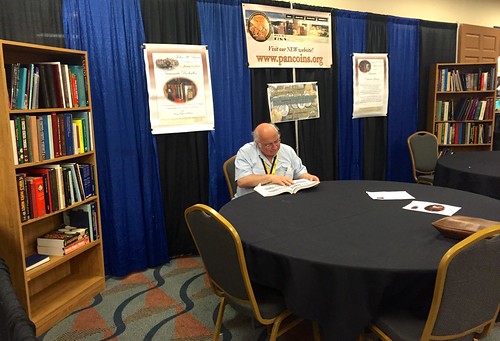
Ed Krivoniak Using the Burns Library
PAN board members manage the Burns Memorial Fund and the library travel arrangements. Donations of money or books are needed to keep this idea a reality in the future. More information can be found on the PAN website on the Donate to PAN page: www.PANcoins.org.
TOKEN, MEDAL AND POLITICAL AUCTION
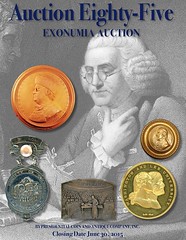
Presidential Coin & Antique Co., Inc.'s Auction Eighty-Five of Tokens, Medals and Political items closes June 30, 2015. Hardcopies $6 - contact Joe Levine at Jlevine968@aol.com or view the catalog online here .
Hard Times Tokens, 19th Century Storecard Tokens, Civil War Tokens, Military & Related, So-Called Dollars, Presidential & Political, World's Fairs & Expositions, U.S. Mint Medals, ANS Medals, Foreign Tokens and Medals, and MORE!
COIN BOARD NEWS NUMBER 35 PUBLISHED
NEW COIN BOARD PUBLISHER IN TOWN
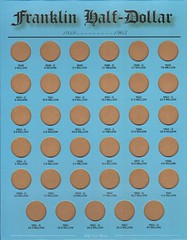 The excitement of the 1930s lives again, as a new publisher of coin boards is offering several titles at reasonable prices. Board collector
Mark Mally has produced his own line which includes entirely new titles, such as that for Franklin Halves. I’m attaching a photo of this
board. Also available now are ones for Indian Head Cents and the complete Lincoln Cent series (three pieces). Other titles will be released
soon. Contact Mark at mallyccb@gmail.com or write to 112 W. Main Street, Stony Point, NY 10980
The excitement of the 1930s lives again, as a new publisher of coin boards is offering several titles at reasonable prices. Board collector
Mark Mally has produced his own line which includes entirely new titles, such as that for Franklin Halves. I’m attaching a photo of this
board. Also available now are ones for Indian Head Cents and the complete Lincoln Cent series (three pieces). Other titles will be released
soon. Contact Mark at mallyccb@gmail.com or write to 112 W. Main Street, Stony Point, NY 10980
SHOW YOUR COIN BOARD PRIDE!
In CBN #34 I made an appeal to all readers to exhibit their coin boards at shows or other venues, and longtime reader Donald Kocken stepped
up to meet this challenge. His extensive coin board display at the recent Numismatists of Wisconsin (NOW) show in Iola drew high praise and
made many persons aware of this hobby for the first time. I’m including a couple photos of Donald and wife Marie at the show with their
exhibit. Let’s hope that others can answer the call, too.
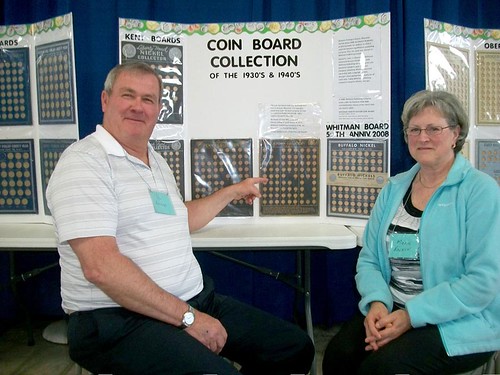
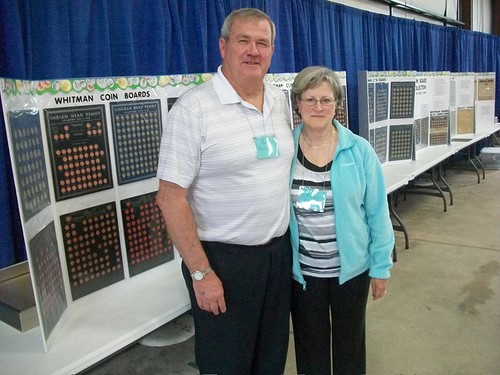
BOOK UPDATES
For the first time since this newsletter began more than seven years ago the past quarter has produced not a single new or revised entry.
That’s not to say that more won’t be found, but the pace has certainly slowed down recently. As a consolation, I’m including with this
newsletter a photo of an Oberwise board on which his change of address from 1308 South Vermont Street to 1317 across the street was noted
by hand.
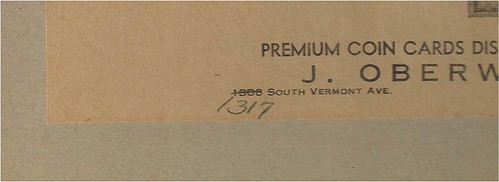
For more information, see:
www.coincollectingboards.net
NOTES FROM E-SYLUM READERS: JUNE 21, 2015
Reader Fan Mail
Ron Guth writes:
The E-Sylum is to heroin as the June 14, 2015 issue is to an overdose
Ron Guth writes:
We're all so addicted, we'd pay the price! That was a great issue...
Advertiser Fan Mail
Steve Davis of Numismatic Auctions L.L.C. writes:
I have had 7 or 8 requests from your newsletter already vs 3 on my last full color full page ad in a print publication.
To read the earlier E-Sylum article, see:
NOTES FROM E-SYLUM READERS: JUNE 7, 2015 : E-Sylum Ads Work!
(www.coinbooks.org/esylum_v18n23a10.html)
British Museum Continental Dollar
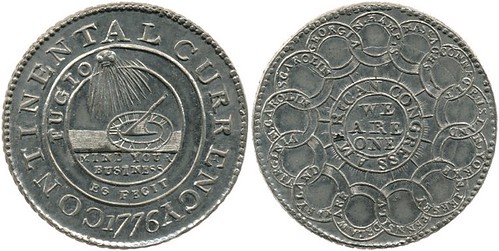
Object type: coin
Museum number: SSB,168.60
Description: Tin coin.
Date: 1776
Production place: Minted in: USA (Americas,North America, United States of America)
Materials: tin
Dimensions: Weight: 17.19 grammes
Location: G46/18/4/8
Acquisition name: Donated by: Dorothea, Lady Banks
Previous owner/ex-collection: Sarah Sophia Banks
Acquisition date: 1818
Department: Coins & Medals
Registration numberSSB,168.60
To read the complete inventory item, see:
Museum
numberSSB,168.60 (www.britishmuseum.org/research/collection_online/collection_object_details.aspx?objectId=937836&partId=1)
To read the earlier E-Sylum article, see:
SARAH SOPHIA BANKS AND THE ‘CONTINENTAL DOLLAR' OF 1776
(www.coinbooks.org/esylum_v18n24a06.html)
Photo of 1856 British Guiana One-Cent Magenta Stamp Owner
David Sundman writes:
Here's a photo from the Smithsonian Postal Museum exhibit of the 1856 British Guiana One-Cent Magenta stamp.
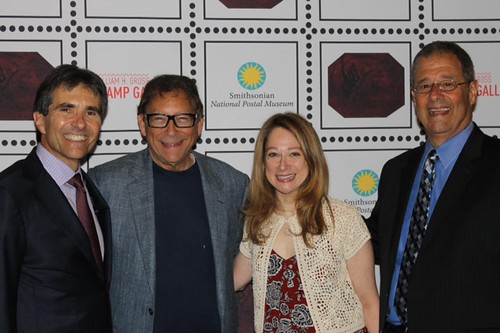
Donald Sundman, Stuart Weitzman, Weitzman's Daughter, and Wade Saadi
Smithsonian Postal Museum photo
To read the earlier E-Sylum article, see:
MORE ON THE ONE-CENT MAGENTA STAMP
(www.coinbooks.org/esylum_v18n24a32.html)
2015 CSNS SYMPOSIUM SPEAKERS ANNOUNCED
The Professional Currency Dealers Association, Central States Numismatic Society and the Chicago Coin Club will collaborate to produce a four session numismatic education symposium on Sunday, November 22 in Rosemont, Illinois. Held in conjunction with the November 19-21 30th Annual National Coin and Currency Convention, the event will take place at the Crowne Plaza Chicago O’Hare, located at 5440 North River Road, one mile from Chicago’s O’Hare Airport.
Ray Lockwood, Education Director for CSNS said, “Our CSNS sponsored educational forums held in association with other numismatic organizations have proven to be highly popular. Our November Rosemont presentation will feature four well known speakers, Steve Feller, Dr. Lawrence Lee, Mark Hotz and Peter Huntoon. Dr. Feller’s subject will be The Money of Iowa from Pre-Civil War to World War II Prisoner of War Scrip. His program will open the symposium at 9am. He’ll be followed at 10:30am by Dr. Lawrence Lee, speaking on The Gold Banknotes of Clark Gruber & Co., Denver City, Colorado Territory 1861-1863. Numismatic columnist Mark Hotz will talk about John Dillinger: America’s Most Wanted and the Banks He Robbed at 1pm. The closing speaker will be national bank note researcher Peter Huntoon at 2:30pm on Colonel Green: America’s Most Extravagant Collector.”
There is a $20 registration fee for members of the Central States Numismatic Society to attend the symposium, $30 for non-members, which includes a one year CSNS membership. The symposium registration fee also includes continental breakfast and a light lunch. Enrollment for the symposium should be made through CSNS Education Director Ray Lockwood at 2075 East Bocock Road, Marion, IN 46952, with checks made payable to “CSNS”.
The symposium will be held the day after the 30th Annual National Coin and Currency Convention at the same Crowne Plaza site. The NCCC public bourse hours will be 10am-6pm on Friday and Saturday, November 20 and 21. Registration for the bourse is $5 for a two day pass. The public hours will be preceded by a Professional Preview and Early Bird Day on Thursday, November 19, for which there is a $75 registration fee. Lyn Knight will hold a three session auction Thursday, Friday and Saturday evenings.
For more information about Central States, see:
www.centralstates.info
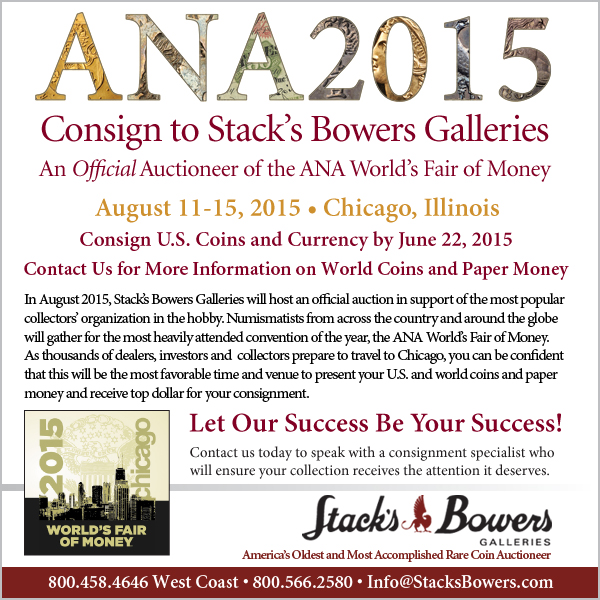
A WOMAN'S PORTRAIT PLANNED FOR U.S. $10 BILL
Treasury Secretary Jacob J. Lew today announced that a newly redesigned $10 note will feature a woman. In exercising his responsibility to select currency features and design, Treasury Secretary Lew will select a notable woman – with a focus on celebrating a champion for our inclusive democracy. In keeping with that theme, the U.S. Department of the Treasury is asking the American people to share ideas, symbols, and designs for the new $10 note that reflect what democracy means to them
In 2013, the U.S. Department of the Treasury selected the $10 note for redesign based on a number of factors and with guidance from the Advanced Counterfeit Deterrence (ACD) Steering Committee, an inter-agency group established to monitor and communicate counterfeit deterrence issues and dedicated to maintaining and ensuring the integrity of U.S. currency. While many factors are taken into consideration, the primary reason for redesigning currency is to address current and potential counterfeiting threats. In addition to featuring a woman, the new $10 note will include a tactile feature that increases accessibility for the visually impaired.
For more information, see:
https://thenew10.treasury.gov/
MELISSA BLOCK, HOST:
And who decides whose face gets on our currency? How is that decision made?
WITTMANN: For paper currency, it's more or less at the discretion of the secretary of the treasury. Now, obviously there are parameters. If you did try to do something crazy, I'm sure Congress would intervene. But in 1928 in 1929 when they made this decision, it was just a committee that he put together that made recommendations. And he actually did not use the recommendations. The committee wanted to go with all presidents, but the secretary of the treasury felt that well-known Americans like Benjamin Franklin and Alexander Hamilton that weren't presidents could also be on the currency.
BLOCK: And there they are still, at least for now.
WITTMANN: Yes, at least for now, right.
BLOCK: I was interested to read about the fact that Martha Washington, wife of George, had her own place on a note or a certificate in the 19th century. What was that about?
WITTMANN: Yes, she was on the $1 silver certificate from 1886 to 1896. And you just have to understand that this is a time when the U.S. government issued a lot more different kinds of money. So there was legal tender, there were national bank notes, there were treasury notes. And so they had a broader cast of characters on these bills. And Martha Washington was chosen and, for a decade, was on the $1 silver certificate.
BLOCK: When you think about likely contenders of the woman who will be on the $10 bill in the end, who do you think leads the pack?
WITTMANN: Well, the candidate I'm backing, if you will, is Amelia Earhart. I think she's an American hero. She's got a broad base of support, which is what you're going to need to be the first woman on a U.S. $10 bill. I think there's a variety of people that could be on there. I know Harriet Tubman would also be a great candidate.
To read the complete article, see:
Woman To Share $10 Bill With
Alexander Hamilton In 2020 (www.npr.org/2015/06/18/415537140/woman-to-share-10-bill-with-alexander-hamilton-in-2020)
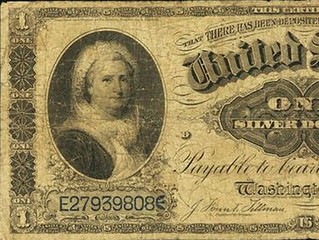 The last time a woman appeared on any U.S. paper money was in the 1800s, when Martha Washington's
portrait graced $1 bills.
The last time a woman appeared on any U.S. paper money was in the 1800s, when Martha Washington's
portrait graced $1 bills.
Some 120 years later, a woman will appear on the $10 bill, the Treasury Department announced Wednesday.Treasury Secretary Jack Lew is asking the public to weigh in on which female historical figure should appear on the bill that will be released in 2020. Some popular suggestions include Harriet Tubman, Susan B. Anthony and Rosa Parks.
In the 1800s, Martha Washington, the USA's first first lady, was featured on the $1 silver certificate — a common form of U.S. currency then, backed the precious metal. Back then, there weren't many high-profile women to chose from, says Manning Garrett, a paper money expert and the president of Manifest Auctions.
"The people featured on money were limited to political figures and if you look back and decide what American woman to put on a silver dollar certificate — women didn't see much of politics, so the pool of candidates was very limited," Garrett tells USA TODAY Network.
To read the complete article, see:
A
woman on U.S. bill? Martha Washington did it
(www.usatoday.com/story/news/nation-now/2015/06/18/martha-washington-united-states-dollar-bills-silver-dollar/28933355/)
Putting a woman on paper notes is certain to be an honor more long-lived than that accorded two history-making women whose images were put on coins. Susan B. Anthony, the social reformer, appeared on silver dollars minted from 1979 to 1981, and again in 1999, and Sacagawea, the Shoshone guide to the Lewis and Clark expedition, was featured on gold-colored dollar coins from 2000. Both coins, which were often confused with quarters, proved unpopular, and production of them was stopped.
Faces on bills have not changed since 1929, when Andrew Jackson replaced Grover Cleveland on the $20 note. Basic currency designs date to that time; redesigns occur every decade or so to deter counterfeiting.
For the latest change, the Treasury has invited the public to use the hashtag #TheNew10 “to spread the word about the redesign.” Also, Mr. Lew and other officials will solicit the public’s ideas in round-table discussions and town-hall meetings.
The note will include tactile features to make it easier for people who are blind or visually impaired to identify the bill.
To read the complete article, see:
(http://www.nytimes.com/2015/06/18/us/portrait-of-a-woman-to-share-space-on-the-dollar-10-bill-with-hamiltons.html?_r=0)
I’M all in for the plan announced last week by the Treasury to put a woman on a piece of American folding money. But in bumping Alexander Hamilton from the center of the $10 bill, we would be exiling the man most responsible for our nation’s having a sound currency in the first place.
The solution is simple: Evict Andrew Jackson from the $20 to make room for a worthy woman. In stark contrast to Hamilton, Jackson did more than most presidents to damage our financial system and our economy.
We are taught early on about Hamilton’s central role in the decision by the newly independent United States to assume the debts of its former colonies, a key step in constructing a sound monetary system and a creditworthy nation. That’s just a tiny example of the achievements and the visionary genius of our first — and greatest — Treasury secretary, who built the nation’s financial architecture from scratch.
In its announcement on Wednesday, the Treasury Department said that “the image of Alexander Hamilton will remain part of the $10 note.” That’s not nearly enough for one of the greatest of our founding fathers.
The various women who’ve been put forward for this pioneering role — including Susan B. Anthony (a second try after her dollar coin flopped, twice), Harriet Tubman and Eleanor Roosevelt — are all outstanding individuals worthy of recognition. Just don’t push aside Alexander Hamilton to make room.
To read the complete article, see:
Leave Hamilton Alone
(www.nytimes.com/2015/06/21/opinion/steven-rattner-leave-hamilton-alone.html)
SEVERAL WOMEN TOUTED FOR $10 BILL
The early favorite is also my own personal favorite -- famed abolitionist and hero of the Underground Railroad, Harriet Tubman. Tubman has been heavily touted as a replacement for Andrew Jackson on the $20 bill. People campaigning to put a woman on the $20 bill held an online poll this year that drew more than 600,000 responses. Tubman got the most votes -- more than 100,000 -- narrowly to beat out former first lady Eleanor Roosevelt.
There are many reasons that Tubman is a front-runner in the race to replace Alexander Hamilton on the $10 bill. She is justly famous for the many people she helped to escape from slavery. Born a slave herself around 1820, she escaped and fled to the North in 1849. But she risked her newfound freedom returning to the South 19 times in the subsequent years. In all, she personally led more than 300 slaves to freedom along the Underground Railway.
During the Civil War, Tubman helped the Union cause by serving as a cook and a nurse for Union troops in Confederate territory. She conducted scouting expeditions for the Union Army, worked as a spy and even helped conduct the planning and execution of Union raids on plantations along South Carolina's Combahee River.
In her later years, Tubman worked for women's right to vote alongside well-known suffragettes such as Anthony. Her social and humanitarian work took so much of her time and energy that she lived much of her life in poverty. Tubman lived until 1913, at the age of around 91 (her date of birth is uncertain). After growing to adulthood as a slave, she helped to end that cruel institution and died only seven years shy of seeing women win the right to vote.
To read the complete article, see:
My choice for the $10 bill
(http://www.cnn.com/2015/06/18/opinions/brazile-choice-for-10-bill-harriet-tubman/)
Will it be Susan B Anthony or Harriet Tubman? Eleanor Roosevelt or Rosa Parks? Following the Obama administration's announcement that a woman will be featured on the $10 bill, this is the first time in well over a century that a female portrait will grace the United States' paper money.
The redesigned bill will be unveiled in 2020 to celebrate the 100th anniversary of the right of women to vote, and the Treasury Department is launching a publicity campaign to solicit suggestions for what it should look like and who should be on it.
Other attempts to incorporate images of women into the currency have failed to take off. Susan B Anthony and Sacagawea had brief sojourns on the $1 coin, so unpopular the mint stopped making them in 2011, and Pocahontas was part of a group portrait on a bill circulated in the mid-19th century. "Young girls across this country will soon be able to see an inspiring woman on the $10 bill who helped shape our country and know that they too can grow up and do something great," says Democratic Senator Jeanne Shaheen, who began moves in April to get a female onto the American currency. "Make no mistake, this is a historic announcement and a big step forward."
Shaheen's legislation was a response to a movement actually calling for an overhaul of the $20 bill. A campaign called "Women on 20s" petitioned the White House this spring to oust Jackson from the denomination. But replacing him with a woman was only part of the reason for targeting this banknote. The group also objected to Jackson's treatment of Native Americans (and he was sceptical about paper money, preferring to use gold or silver).
The Women on 20s campaign went viral and more than 600,000 people voted in an online poll. Out of a list of 15 women suggested by the group, slavery abolitionist Tubman emerged as the top choice.
To read the complete article, see:
When America puts a woman on its $10 bill, who will be the best symbol of democracy?
(www.independent.co.uk/news/world/americas/when-america-puts-a-woman-on-its-10-bill-who-will-be-the-best-symbol-of-democracy-10330060.html)
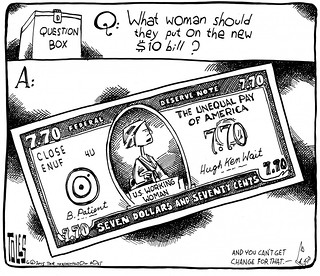
TIME CAPSULE RETURNED TO MASSACHUSETTS STATEHOUSE
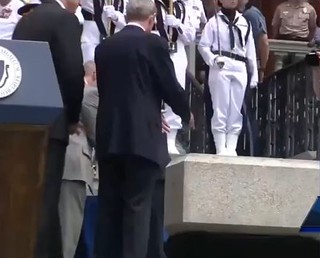 In an elaborate ceremony steeped in tradition, a time capsule dating to 1795 was returned Wednesday
to the cornerstone of the Massachusetts Statehouse, with a set of 2015 U.S. mint coins and a silver plaque added to its contents for a
future generation to discover.
In an elaborate ceremony steeped in tradition, a time capsule dating to 1795 was returned Wednesday
to the cornerstone of the Massachusetts Statehouse, with a set of 2015 U.S. mint coins and a silver plaque added to its contents for a
future generation to discover.
A procession of freemasons marched up Beacon Hill as a fife and drum corps, clad in Colonial garb, played on the Statehouse lawn. Military units stood at attention and a 19-gun salute was fired, all part of an effort to approximate the historically documented atmosphere of July 4, 1795, when the newly built cornerstone was drawn by 15 white horses from Boston's Old South Church, across Boston Common to the construction site for the new state capitol.
On that day, then-Massachusetts Gov. Samuel Adams and Paul Revere, then Grand Master of the Grand Lodge of Masons, presided over a ceremony in which the time capsule was first deposited into the cornerstone.
During Thursday's ceremony, Gov. Charlie Baker joked that Adams is today better known to many people as a beer-maker than a key Revolutionary-era figure. But he said it was humbling to consider that the original capsule was placed just 15 years after Massachusetts adopted its constitution.
"What makes this time capsule so unusual is it's not an interpretation from a historian, it's not a passage in a text book, it's the story that our predecessors from that Revolutionary time wanted us to know and understand," Baker said.
The original container included an engraved silver plaque, a medal in honor of George Washington and a set of coins including one believed dated to the mid-1600s.
The capsule was removed in 1855 during construction of a new wing of the building. Its contents were transferred to a sturdier brass box and new items, including coins and newspapers, were added. Rediscovered last year during a water filtration project, the box was gingerly excavated from the building and later opened by conservators at the Museum of Fine Arts.
The latest contents, not revealed until Thursday's ceremony, were a 2015 U.S. mint coin set - including dollar coins of Presidents Truman, Eisenhower, Kennedy and Johnson - and a silver plaque commemorating Thursday's event.
As was the case in 1855, the contents were placed in a new container, this one made of stainless steel with an oxygen-free interior to prevent deterioration.
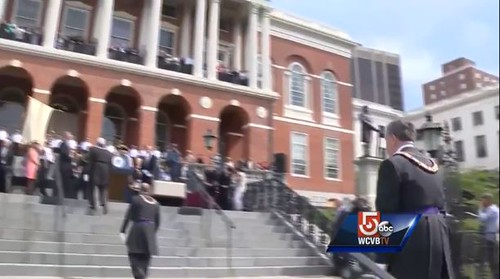
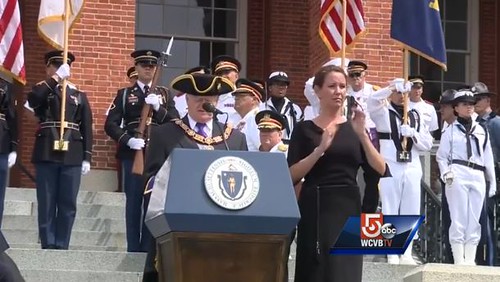
To read the complete article, see:
Time capsule returns to Statehouse
cornerstone (www.wcvb.com/news/time-capsule-returns-to-statehouse-cornerstone/33625694)
To read the earlier E-Sylum articles, see:
1795 MASSACHUSETTS STATE HOUSE TIME CAPSULE
(www.coinbooks.org/esylum_v17n51a12.html)
BOSTON TIME CAPSULE OPENED (www.coinbooks.org/esylum_v18n02a08.html)
MASSACHUSETTS STATE HOUSE TIME CAPSULE EXHIBIT
(www.coinbooks.org/esylum_v18n12a09.html)
THE BOOK BAZARRE
MORE SELECTIONS FROM NUMISMATIC AUCTIONS SALE #57
Lot 927: Civil War Dog Tag. Liberty Seated Half Dollar, 1858
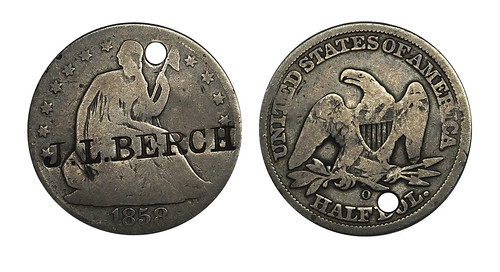
Possible Civil War Dog Tag. Liberty Seated Half Dollar, 1858- O with single-line letter punch “J.L. BERCH” across obverse and holed at 12 o’clock. Host coin Toned VG, countermark EF. A little research might yield the background of Berch. ($75+)
Steve Davis adds:
The soldier in lot 927 had a colorful history in the Civil War out of Racine, WI - his family settled postwar in a town about 20 miles from my office where this item came from - he played a role in the escape of a freed slave.
For more information, see:
Wisconsin Union Soldiers and Runaway
Freedwoman (http://civilwartalk.com/threads/wisconsin-union-soldiers-and-runaway-freedwoman.80974/)
Lot 950: Pedley-Ryan Dollar, 1933
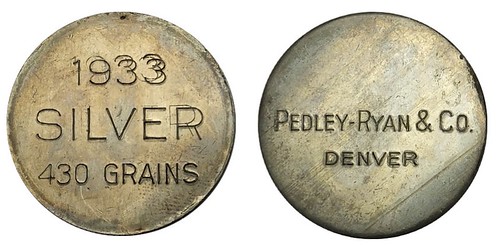
Pedley-Ryan Dollar, 1933. HK-825. Double-struck ltly toned Unc. Scarce. ($150+)
Lot 1125: Araucania-Patagonia: Piedfort Peso in Silver, 1874
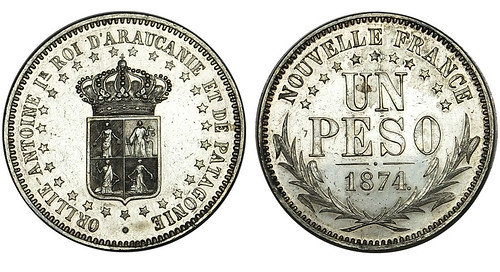
Piedfort Peso in Silver, 1874. Bruce-X#13. Hairlined Proof with some scattered inclusions. Very scarce as a piedfort and lacking in recent auction records, originally acquired in 1958. ($1000-1500)
Lot 1181: Brazil Fantasy Ceara 960 Reis Countermark
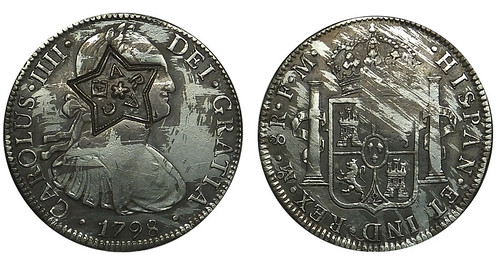
Countermarked Coinage. Fantasy Ceara 960 Reis Countermark Star on Mexico 8 Reales, 1798-MoFM. See Bruce notes on such issues. Host coin retoned VF, c/m EF. An example as of many spurious issues from the Howard Gibbs/Hans Schulman Auction,
Lot 1186: British Honduras Fantasy Countermarked French Ecu
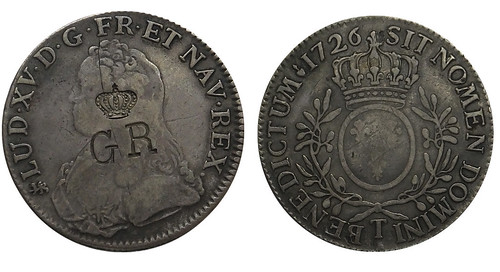
Fantasy Countermarked French Ecu, 1726-T. Features incuse “Crowned GR” c/m – See Bruce-X#5. Host coin toned VF, c/m EF. Ex: Hans Schulman as Jamaica, interesting history on this blatantly spurious issue. ($100+) 1187. Decimal Coinage. Cent, 1909. KM-
Lot 1207: Costa Rica Fantasy Countermarked 8 Reales Countermark
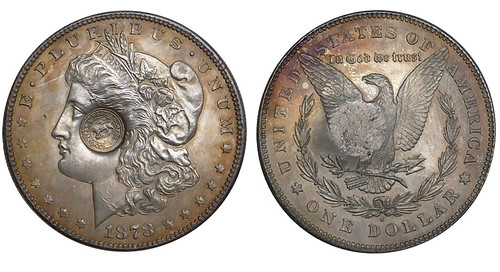
Fantasy Countermarked 8 Reales Countermark on genuine Morgan Dollar, 1878-S. See Bruce-X#20 and detailed notes. Nicely executed on gold and violet toned Unc host coin. Ex: Howard Gibbs/Hans Schulman Auction of 3/18-19/1966 – Neat curio item. ($100-150)
For more information, see:
www.numismaticauctionsllc.com
To read the earlier E-Sylum articles, see:
NUMISMATIC AUCTIONS SALE #57 CLOSES JUNE 29, 2015
(www.coinbooks.org/esylum_v18n22a14.html)
SELECTIONS FROM NUMISMATIC AUCTIONS SALE 57
(www.coinbooks.org/esylum_v18n23a20.html)
QUERY: ENGLISH LANGUAGE NUMISMATIC DICTIONARY HELP SOUGHT
Gary Beals writes:
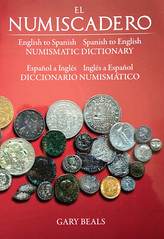 I am
now working on a new book from here in Spain and I will keep you folks apprised of its progress — perhaps to press in 2 or 3 months. It
will be about 200+ pages.
I am
now working on a new book from here in Spain and I will keep you folks apprised of its progress — perhaps to press in 2 or 3 months. It
will be about 200+ pages.
I noted the mention of Howard Daniel's glossary terms. Is there so way I could check my material against that? I am taking an international approach to my book.
I'm happy to share anything Hispanic in my book, and I would like to have some volunteer editors for the English language stuff. Can anyone help?
I was a serious collector in the 1960s as a teen and college kid, wrote NUMISMATIC TERMS OF SPAIN & SPANISH AMERICA in 1966 — and about 1969 I dropped out of collecting for some 40 years! I'm back!
THE GEORGE G. EVANS GIFT BOOK STORE
George G. Evans was the publisher of The Illustrated History of the United States Mint. He owned a bookstore in Philadelphia and sold many a copy to tourists visiting that city. During the Civil War, he was also an issuer of Encased Postage Stamps. Pete Smith writes:
This morning I came across the image of a lithograph of George G. Evans' "Gift Book" store at 439 Chestnut Street in Philadelphia. This copy is at the Historical Society of Philadelphia. Other copies may also have survived.
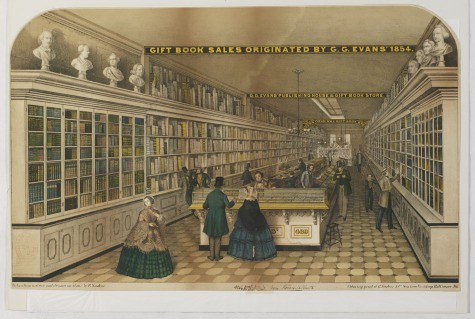
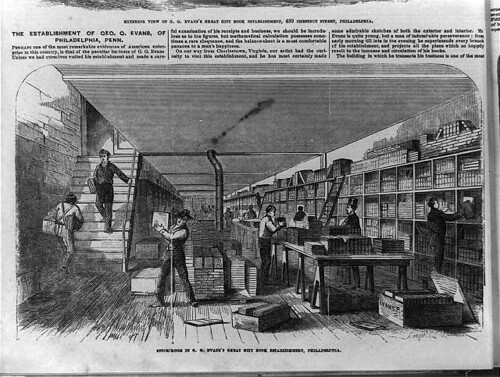
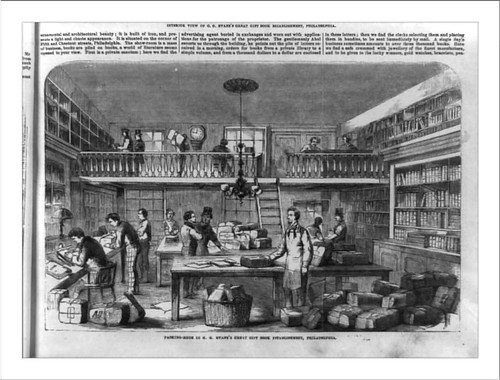

Archives International Auctions, Summer Auction 2015
The Rudolph P. Laubenheimer Family Archives
Highlights include:
- Lot 30: A.C. Paquet, Business Card ca.1860-70's
- Lot 66: Exposition prize medal line art
- Lot 303: New Orleans, Cotton States Exposition, 1884 Lead Die Trial
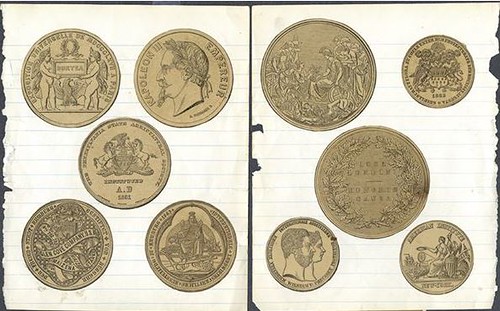
1580 Lemoine Avenue, Suite #7
Fort Lee, NJ 07024
Phone: 201-944-4800
Email: info@archivesinternational.com
WWW.ARCHIVESINTERNATIONAL.COM
DRESDEN COIN CABINET REOPENS
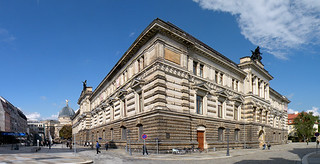 One of the internationally most important universal collections of coins and medals has returned to its origin. Since 6 June visitors can
see Dresden’s coin collection in the Georgenbau of the Dresden Residenzschloss.
One of the internationally most important universal collections of coins and medals has returned to its origin. Since 6 June visitors can
see Dresden’s coin collection in the Georgenbau of the Dresden Residenzschloss.
Since the end of WWII only a small permanent exhibition represented the coin cabinet in the so-called Albertinum Museum. During the last 10 years the museum has even been restricted to smaller temporary exhibitions.
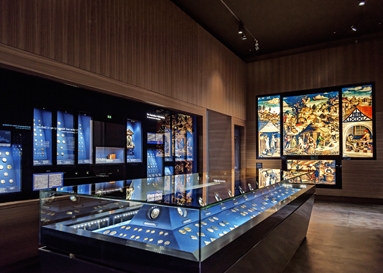
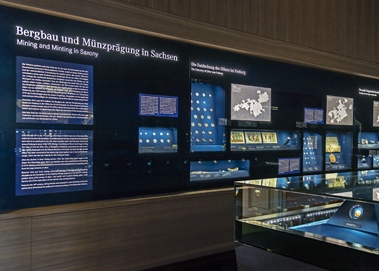
The coin cabinet was founded by George the Bearded (1500-1539). At the epoch it was housed in the Georgenbau, a part of the Residenzschlosses where it has now eventually returned to.
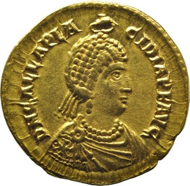
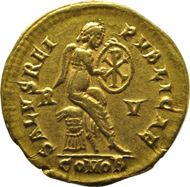
Empress Galla Placidia (421-450), Solidus, Ravenna mint, gold
Objects in the Dresden coin cabinet range from antiquity until today. The cabinet has grown over nearly five centuries up to over 300,000 objects comprising not only coins and medals but also orders and decorations, banknotes, historical security papers, dies of coins and medals, signets, models, premonetary means of payment, and coin-producing machines and instruments. And, of course, the world’s largest collection of coins and medals from Saxony.
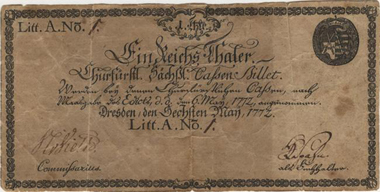
In the ‘medals and orders’ room the focus lies on the development of the medal art from Renaissance time to today. To Orders and decoration medals a special section has been dedicated here, too.
In the Elbsaal room eight different topics ‘Around money’ are presented in a showcase each breaking deliberately with the chronological order in the other rooms.
Here visitors learn about coins and metals, curious shapes of money or inventive names of money. Under the title ‘From the thaler to the dollar’ the triumph of the world’s most prominent and half a millenium old currency is vividly presented. You can find more information on the coin cabinet on the official website of the museum.
To visit the museum web site, see:
Münzkabinett (Coin Cabinet)
(www.skd.museum/en/museums-institutions/residenzschloss/coin-cabinet/index.html)
To read the complete article, see:
Coin Cabinet Dresden re-opens (www.coinsweekly.com/en/News/4?&id=3491)
NUMISMATICS IN COPENHAGEN MUSEUMS
Copenhagen is much more than the Little Mermaid and Tivoli. It is a city which match up to every metropolis throughout the world thanks to its museums. The National Museum of Denmark houses treasures like the Trundholm Sun Chariot and the enigmatic Gundestrup Cauldron, the Thorvaldsen Museum as the world’s first museum devoted to one single artist, and the Ny Carlsberg Glyptotek with its outstanding portrait gallery of Roman emperors – in their permanent exhibitions, they all display coins, medals, and orders. Those are not the only places in Copenhagen where something interesting, in terms of numismatics and economic history, can be encountered though. Today, we visit the museums of Copenhagen to search for numismatic traces.
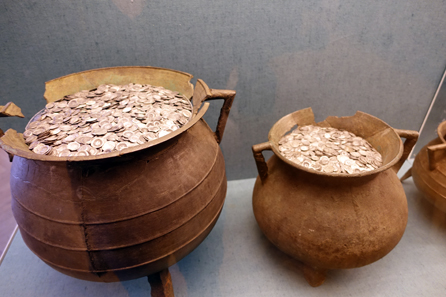
Here you see the Kirial Hoard which was buried around 1365. With its 81,000 (sic!) coins from Northern Germany, England and France, it is the largest hoard ever discovered in Denmark.
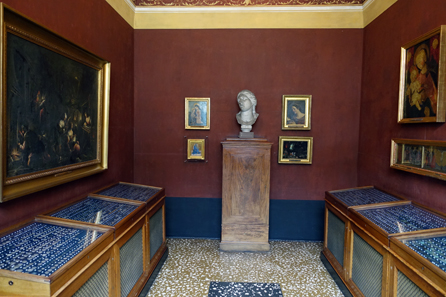
It goes without saying that Thorvaldsen possessed a high-caliber coin collection, on display on the upper floors. It consisted of 2,794 Greek coins and 673 Roman-Byzantine specimens that all became part of the museum. Roughly 1,000 coins were auctioned in Copenhagen as early as 1866. Much of the remaining material is still exhibited in the museum.
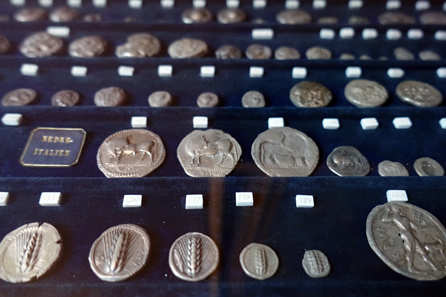
As is his extensive collection of Greek, Roman and Egyptian antiquities. The sculptor further assembled a collection of plaster casts of famous ancient statues which served as an inspiration for his own creations.
To read the complete article, see:
The Numismatic Side of Copenhagen: 2. The Museums
(www.coinsweekly.com/en/News/4?&id=3488)
THE BOOK BAZARRE
THE FORTS VISIT SCOTLAND'S NUMISMATIC MUSEUMS
In response to an emailed invitation to a meeting near Pittsburgh of the Pennsylvania Association of Numismatists (PAN), Tom Fort responded:
As some of you know I am presently a bit out of town and shall not be able to make this month's PAN meeting. However, I do have a suggestion. On the 26th I shall be again in Edinburgh and Gosia and I found a great place to eat -The Auld 100- a pub and restaurant located in the new town. Why don't we all meet there instead?
I can invite Dr. Lynday McGill, the keeper of medieval antiquities at the National Museum of Scotland. Afterwards we could prevail upon her to give us tour through their massive exhibit on Scottish coins. Once we are finished there we could go to the Bank of Scotland Museum on the Mound and see their galleries of Scottish coins and paper money. All you have to do is be here by then. So instead of going where we usually go, let's try something different. I'll see you all at the NMS on the 26th.
While Tom was slaving through numerous trays of Scottish coins in the National Museum, Annamaria and I took a wonderful three hour walking tour of Edinburgh filled with history and great stories of kings, rebellions, scientific discoveries and ground breaking inventions of Scots. Inspired by our tour guide we went to see two exhibits on early people and beginnings of Scotland, and on the Kingdom of Scots.
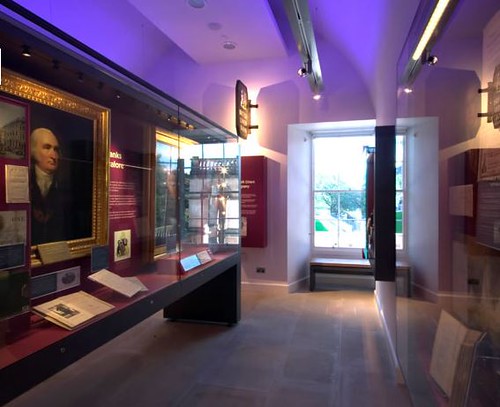
Bank of Scotland Museum Exhibit
Tired and dragging our feet we stopped at the Bank of Scotland museum. It fairly new, less than 10 years old, and it is known as Museum on the Mound (MoM). It is small but fantastically rich and has seven display rooms covering the history of the Bank as an financial institution and its building, history of money and money making, security from safe, fraud, crime to building societies and following the dream of house owning to life insurance.
They have great displays of paper money and coins of all Scottish kings. I must have been exhausted with all this abundance of information because my brain did not want to process everything I read so I spend a few minutes staring at the introductory display case pondering why there was a bottle of whisky there? But everything there was eye pleasing so even though I could not find answer to the why question, it looked good!
They have a case of one million pounds in £20 notes to illustrate the mighty presence of money. Very cool. The website does not have enough, we have to visit the museum to appreciate it fully. I highly recommend it.
1890'S BANK OF ENGLAND FIVE POUND BANKNOTE IMAGES SOUGHT
Greg Ruby writes:
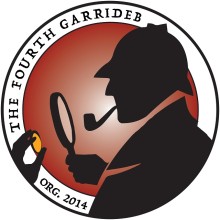 I'm hoping that the readership of The E-Sylum can assist me by providing digital photographs of Bank of England 5 Pound
banknotes that circulated during the 1890's. We are trying to put together a post on counterfeiting in Victorian England for our
website, www.FourthGarrideb.com. Our namesake story, The Adventure of The Three
Garridebs, deals with a printing press and counterfeit 5 pound notes.
I'm hoping that the readership of The E-Sylum can assist me by providing digital photographs of Bank of England 5 Pound
banknotes that circulated during the 1890's. We are trying to put together a post on counterfeiting in Victorian England for our
website, www.FourthGarrideb.com. Our namesake story, The Adventure of The Three
Garridebs, deals with a printing press and counterfeit 5 pound notes.
Items can be sent to Greg@FourthGarrideb.com and all assistance will be credited in the post. Many thanks in advance!
THE 1973 SERIES A AND B COINS OF GREECE
The coup, led by Colonel George Papadopoulos, was well planned. Tanks took control of the streets of Athens while the military arrested prominent politicians. The King behaved indecisively: initially he refused to cooperate with the military, but eventually, hoping to be a restraining influence, he swore in a new junta government. The junta, though, regarded him as a mere figure head.
The Regime of the Colonels was right-wing, authoritarian and repressive. Opponents of the junta were routinely arrested and brutally tortured. On December 13, 1967 the King attempted a counter-coup in the northern city of Kavala, but it was poorly planned and executed, and pro-Junta offi cers easily foiled it. On December 14, Constantine escaped by plane to Italy with his family. Colonel Papadopoulos now made himself Prime Minister of Greece, while General Zoitakis was appointed Regent.
In March 1972 Papadopoulos increased his power by appointing himself regent in place of Zoitakis, while still retaining the premiership. And when the coins for 1973 were issued, the designs of the 10 and 20 lepta coins, the smallest denominations, had changed. The soldier and phoenix replaced the royal crown on the obverse, and two fine new designs graced the reverse: two dolphins and a trident on the 10 lepta, while the 20 lepta featured an olive branch.
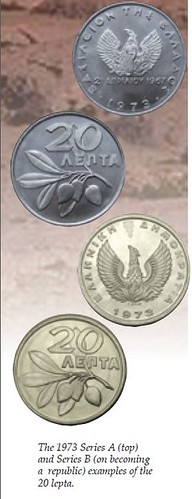 These two coins had also been reduced in diameter by two millimetres each, and they now no longer had a
central hole. Though the King’s portrait was retained on the higher denominations, the emblem of the regime now appeared on one side of
every coin.
These two coins had also been reduced in diameter by two millimetres each, and they now no longer had a
central hole. Though the King’s portrait was retained on the higher denominations, the emblem of the regime now appeared on one side of
every coin.
Additionally a circulation 20 drachmai coin was issued for the first time: the King’s portrait was absent and the obverse sported the soldier and phoenix emblem instead, whilst the charming reverse design, adapted from the silver 20 drachmai collector coin of 1960 and 1965, depicted Selene the moon goddess. This coin comes in three types, with variations in the size of the rim, the waves behind the horse’s hoof, and the thickness of Selene’s veil.
Throughout 1973 Papadopoulos softened his censorship and released some political prisoners, in order to head off discontent. In the summer he held a referendum on the monarchy, though it was probably rigged. Some 89 per cent of the electorate apparently voted against the still exiled King, and accordingly on June 1, 1973 Papadopoulos declared Greece a republic, with himself as President!
This sudden constitutional change explains the two different coin series issued in 1973. The monarchical issues of early 1973, known as Series A, carried the King’s portrait, or else the “phoenix and soldier” emblem of the dictatorship, or both. The 10 and 20 lepta and 20 drachmai coins were one year types. The coins of Series B were issued in the second half of 1973, after the switch to a republic; on these a new version of the phoenix, but without the soldier, replaced the regime’s emblem. This demilitarised emblem, which seemed to hint at a return to democracy, appeared on the obverse of all the Series B coins.
The reverse designs of the 10 and 20 lepta of Series A, the dolphins and olive branch, were retained on Series B, but new reverse designs were adopted on the higher denominations in order to replace the King’s portrait. The 50 lepta now sported an attractive ornamental design; a little owl graced the 1 drachma and 2 drachmai; the 5 and 10 drachmai featured a delightful depiction of Pegasus, the mythical winged horse; whilst the 20 drachmai sported a splendid design of the goddess Athena. All the coins of series B were one year types.
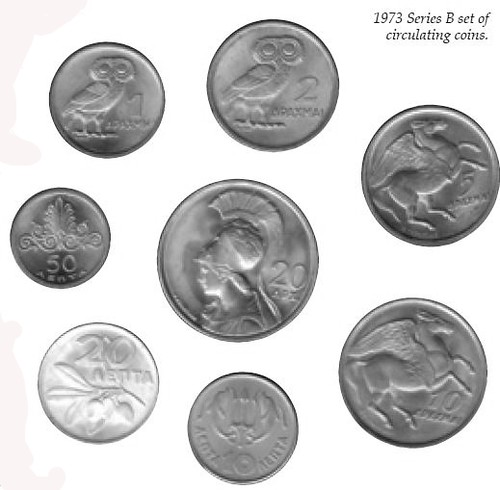
To vist the Token Publishing website, see:
www.tokenpublishing.com

MORE FAMOUS NAMES ON OBSOLETE BANKNOTES
Dave Bowers writes:
In the early days, notes of state-chartered banks had a space for the name of the payee, or the first person receiving an issued note, to be filled in with ink. This really had no meaning, took up a teller’s time, and instead the names of famous people, often with a first initial then a surname, were PRINTED on the notes. These famous people had no connection of any kind with the banks.
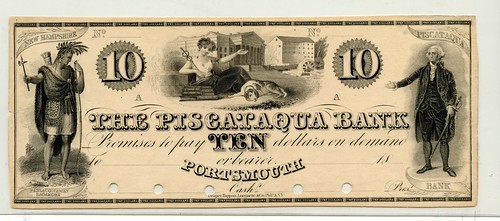
blank space for payee
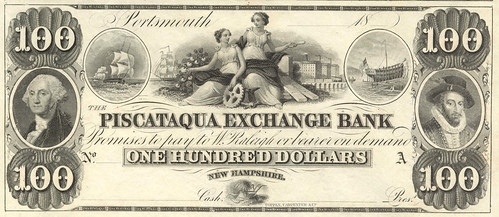
W. Raleigh (printed)
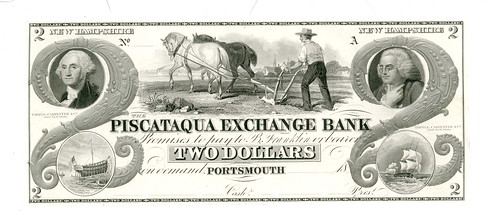
B. Franklin (printed)
David Gladfelter concurs. He writes:
Chris Neuzil’s theory, that the reason for famous persons being named as payees on obsolete bank notes and scrip was to facilitate acceptance of the notes in commerce, is exactly right. Because the notes were made payable to an individual “or bearer,” they were legally negotiable as bearer paper, regardless of whether a specific payee was named on it or had endorsed the note. Usually the named payees were bank officials, or locally known political or military persons. Their names on the notes were intended to generate public confidence that the notes were good, but they had no legal significance. And many times that confidence was misplaced.
Here’s an example of a scrip note issued by a New Jersey iron works having the name of H(enry) Clay as the payee. Although the note was printed with an 1840 date, it could not have been issued prior to 1858, since the signer, R(iley) A. Brick, did not come of legal age until then. Clay, a well-known national political figure and Whig presidential candidate in 1844, had died in 1852.
A more unusual obsolete note is one signed fictitiously. Here’s one dated 1837 issued by a country store keeper in New Jersey, but purportedly signed by “Napoleon Bounaparte.” The real Napoleon spelled his name without the “u” and had died in 1821, 16 years prior. But Napoleon’s brother Joseph then lived in Bordentown, a few miles from Jobstown. Joseph was well known and well liked in the area.
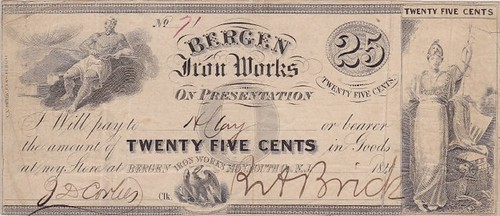
Bergen Iron Works: Payable to H. Clay
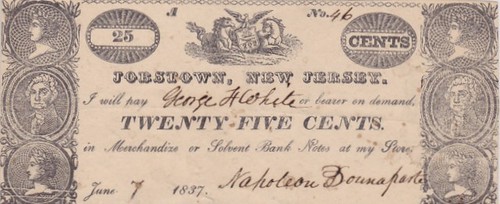
Jobstown, NJ: Napoleon Bounaparte
To read the earlier E-Sylum article, see:
QUERY: WHY ARE FAMOUS NAMES USED ON OBSOLETE BANKNOTES?
(www.coinbooks.org/esylum_v18n24a16.html)
THE WILDCAT BANK OF TINKERVILLE
Luckily, there is a wonderful first-person account of the rise and fall of a wildcat bank by Caroline Kirkland (1801-1864). Born Caroline Matilda Stansbury, she was a well-educated woman from New York who moved to Michigan to head the Detroit Female Seminary in 1835 with her husband, classics scholar William Kirkland. William became caught up in the speculative land boom that accompanied statehood, and in 1837 purchased eight-hundred acres of land where the village of Pinckney was founded about fifty miles west of Detroit.
Feeling somewhat isolated in their new environs, Caroline spent her days writing long and observant letters to friends and colleagues about the trials and tribulations of Western life. These letters coalesced into her first book, A New Home–Who’ll Follow? or, Glimpses of Western Life, which was first published by C. S. Francis in 1840 and quickly became a runaway success that went through numerous editions. Writing under the nome de plume of Mrs. Mary Clavers, Kirkland’s work consisted of perceptive and often satirical sketches of life in the fictionalized frontier town of ‘Montacute.’
the lively passage excerpted below chronicling the rise and fall of the “Merchants’ and Manufacturers’ Bank of Tinkerville” is a wonderful example of her keen eye for detail and sharp wit. Kirkland’s narrative captures something of the enthusiasm that so often accompanied such ventures, at least initially, as well as the impact that these schemes had on the community. The entire book ... is well worth a read.
Some thirty banks or more were the fungous growth of the new political hot-bed; and many of these were of course without a ‘local habitation,’ though they might boast the ‘name,’ it may be, of some part of the deep woods, where the wild cat had hitherto been the most formidable foe to the unwary and defenceless. Hence the celebrated term ‘Wild Cat,’ justified fully by the course of these cunning and stealthy blood-suckers; more fatal in their treacherous spring than ever was their forest prototype. A stout farmer might hope to ‘whip ‘ a wild cat or two; but once in the grasp of a ‘wild cat bank,’ his struggles were unavailing. Hopeless ruin has been the consequence in numerous instances, and every day adds new names to the list.
To read the complete article, see:
THE WILDCAT BANK OF TINKERVILLE
(www.anspocketchange.org/wildcat-bank-of-tinkerville/)
QUERY: GEORGIA CIVIL WAR OVERPRINTED SCRIP NOTES
Dave writes:
It is well-known that in the South during the Civil War there was a shortage of paper for printing. Many bank notes and scrip notes were printed on the blank backs of four-subject currency sheets of banks no longer in business. Such notes have the new or current note on the face, and on the back is a section from an earlier unused sheet.
Now comes the question: In a number of instances a bank that was still in operation during the Civil War printed small-denomination notes on the blank backs of sheets of its own high-denomination notes. As inflation was rampant, it seems to me that cutting apart the original sheets to use high-denomination notes would have made more sense.
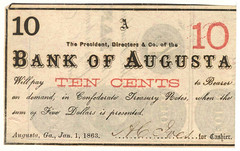
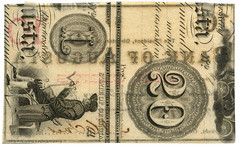
Bank of Augusta
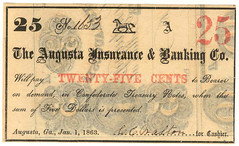
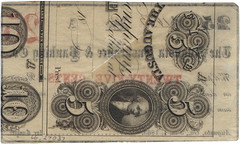
Augusta Insurance & Banking Co
THE BOOK BAZARRE
CIA INFORMATION OPERATIONS CENTER MEDAL
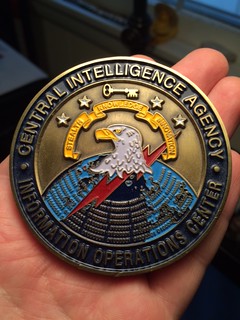 E-Sylum contributor Matt R. is a collector of medals and challenge coins issued by the Central Intelligence Agency (CIA). He
shared with us an image of his latest acquisition. Thanks! -Editor
E-Sylum contributor Matt R. is a collector of medals and challenge coins issued by the Central Intelligence Agency (CIA). He
shared with us an image of his latest acquisition. Thanks! -Editor
Matt R. writes:
I recently acquired a CIA Information Operations Center 3" medallion. The back is blank.
To read the earlier E-Sylum articles, see:
CENTRAL INTELLIGENCE AGENCY MEDALS (www.coinbooks.org/esylum_v13n02a16.html)
MORE ON CENTRAL INTELLIGENCE AGENCY MEDALS
(www.coinbooks.org/esylum_v13n05a12.html)
SOME MORE CENTRAL INTELLIGENCE AGENCY MEDALS
(www.coinbooks.org/esylum_v13n06a14.html)
SOME MORE SELECTIONS FROM PRESIDENTIAL AUCTION #85
Lot 464: ART DECO ACHIEVEMENT AWARD PLAQUE

ART DECO ACHIEVEMENT AWARD PLAQUE, ND. 8 ¾” Cast Bronze. Signed, “F. K. HE?DA” Two mounting screws affixed to the reverse. ACHIEVEMENT inscribed above two classical archers with their bows drawn. In the background is a skyscraper, industrial factory with smokestack and several tools emblematic of American industry. AZ ribbon below is inscribed AWARD.
This classic cast bronze plaque has all the hallmarks of high style Art Deco: repeated, stylized figures, allusions to classic Greece and Rome, stepped skyscrapers, and American industry.
Lot 490: REJECTED DESIGN OF THE ANS 125TH ANNIVERSARY MEDAL, 1983
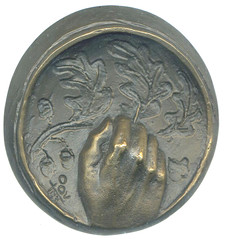
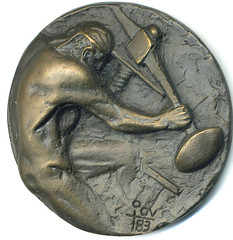
REJECTED DESIGN OF THE ANS 125TH ANNIVERSARY MEDAL, 1983. A set of two uniface casts, each 72.8mm. Bronze. Marcel Jovine, Sc. Cast and patinated by Greco Industries. Uncirculated. Alan Stahl has described these as follows: “The two sides of the medal proposed by Jovine depict two stages in the production of a medal or of a coin, the engraving of the die and the striking of the blank.
In the presentation of the obverse, the surface of the medal becomes the actual die and the viewer becomes the engraver, looking down at his own hand raised in high relief carving into the die the oak leaf cluster that is the symbol of the American Numismatic Society.
On the reverse, the body of the striker follows the curve of the medal’s edge, while one arm of the screw press projects at an oblique angle.”
It was this design that was initially selected by the Society Medals Committee for the 125th Anniversary medal. To their great surprise, the design was rejected by the Council on various grounds, none of which were found particularly persuasive by the members of the Medals Committee. Nonetheless, they asked Jovine to submit another design which met the mandates of the Council.
Despite Council’s reaction, some members of the Medals Committee were so pleased with the rejected design that 12 sets of uniface casts were ordered from the artist. To our knowledge, this is only the second of that group to reach the auction block. We sold the first in our 2013 83rd Sale for $546.25.
Lot 555: YOUNG’S PIER FLIP-FLAP RAILWAY
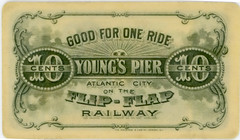
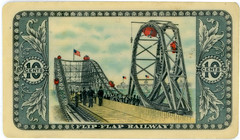
CELLULOID PASS GOOD FOR ONE RIDE AT YOUNG’S PIER, ATLANTIC CITY. 2 x 3 ½” Near Mint. 2 x 3 ½” The colorful celluloid (made by Whitehead-Hoag) was valued at 10¢ - the price of one ride on the “Flip-Flap Railway.” A great display piece!
To read the earlier E-Sylum articles, see:
SELECTIONS FROM PRESIDENTIAL AUCTION #85
(www.coinbooks.org/esylum_v18n23a26.html)
MORE SELECTIONS FROM PRESIDENTIAL AUCTION #85
(www.coinbooks.org/esylum_v18n24a37.html)
ANCIENT COIN MOLDS FOUND IN NORTH CHINA
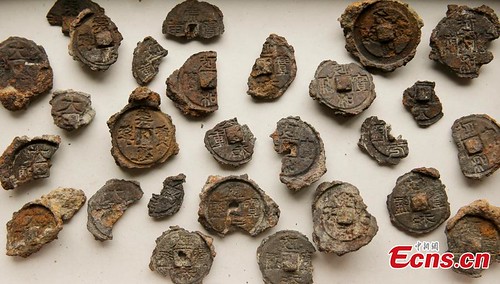
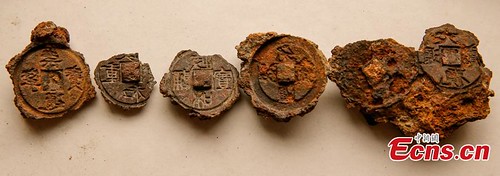
Casting molds used to produce ancient coins in Northern Song Dynasty (960-1127) are seen in Yuncheng city, North China’s Shanxi province. Two enthusiasts of the city's salt lake culture discovered the molds while taking photographs of birds there. Yuncheng’s salt lake, known as "China's Dead Sea,” has a history as a source of salt crystals for over 4,000 years.
To read the complete article, see:
Ancient coin molds found in North China city(1/4)
(www.ecns.cn/visual/hd/2015/06-15/68662.shtml)
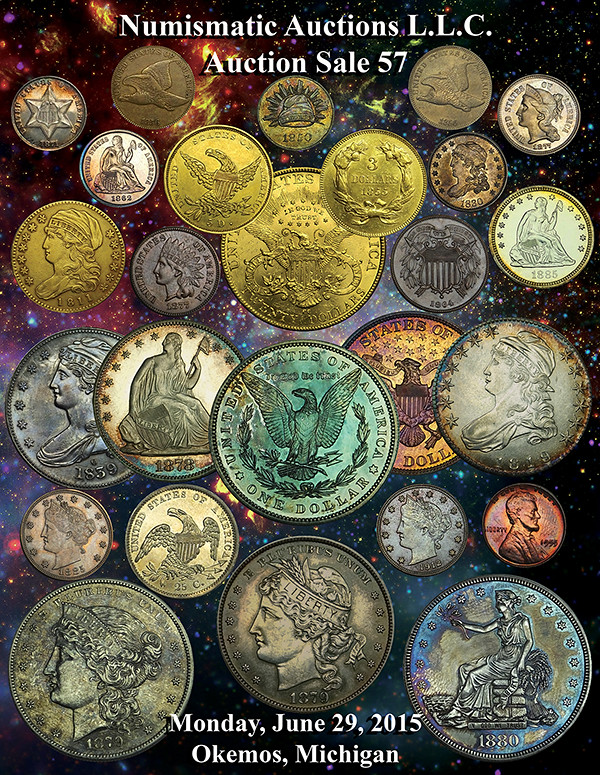
COINS IN DON QUIXOTE
What brings you to the ANS today?
I am working on a book project right now about the representation of Jerusalem in early modern Spanish culture and how the politics and interests of Spain in the Holy Land were refracted in art and literature. I also am finishing up an article on the place of coins in a particular episode of Don Quixote that deals with the expulsion of the Moriscos. In the 16th Century, ‘Morisco’ was a term used to refer to the descendants of Muslim people in Iberia, who were expelled from Spain in 1609-1614. Moriscos were officially converts to Christianity, but most of them only nominally so. One of the characters in the novel, Ricote, was a Morisco who was expelled but then sneaks back to recover some buried treasure. The buried treasure of Ricote has been studied a lot from an economic angle, but I am looking at what happens when we read the coins as objects–looking at the marks and inscriptions on them to see the propagandistic messages that were circulating at the time. The discourses used to justify the expulsion were connected to Crusade propaganda and ideas about Spanish national identity, and these same messages are communicated through those coins. So there’s an interesting ironic tension between the character’s own biography and the coins he is coming back to recover. The thing that got Ricote expelled in the first place is stamped on his coins.
In Don Quixote, Ricote has all different kinds of money. Most of his money is in the form of escudos and initially I was just surprised by how small escudos are. The expulsion of the Moriscos happened under the reign of Philip III (1598-1621) and the ANS has an escudo from that period and also a gold Portuguese cruzado from a little bit earlier.
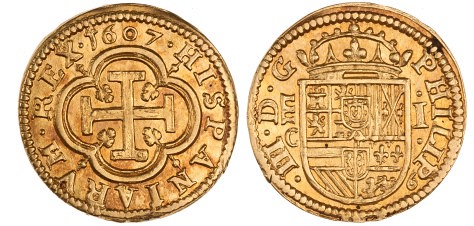
Both pieces are really fascinating. In the heraldry of the period there is a particular kind of cross called the cross potent that was a mark of the crown of Naples, which was in turn connected to both the crown of Jerusalem and the crown of Aragon through marriage and conquest. The cross potent came to represent the Kingdom of Jerusalem. These coins have crosses potent on them and the reason why this is significant in the period as it relates to propaganda and the expulsion is that this particular kind of cross gestures to Crusader propaganda and the idea of universal battle against Islam. It embodies the idea that Spain is destined to reconquer Jerusalem. These kinds of ideas were used to justify the expulsion of the Moriscos in 1609 and this is a connection I want to highlight.
To read the complete article, see:
PROFILES IN RESEARCH: CHAD LEAHY
(www.anspocketchange.org/profiles-in-research-chad-leahy/)
MEDIEVAL COIN HOARD DISCOVERED IN WALES
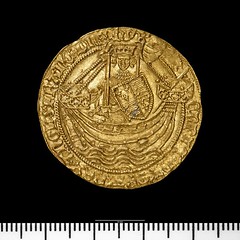 A pensioner from Wrexham has uncovered thousands of pounds worth of medieval treasure in his
friend’s field.
A pensioner from Wrexham has uncovered thousands of pounds worth of medieval treasure in his
friend’s field.
The impressive hoard of three 23 carat gold and twenty five silver coins was made by 86-year-old Cliff Massey from Caia Park during two separate visits to Iford Edwards' farm near Bronington.
It’s unknown the value of the discovery but a similar find of gold and silver coins made in 2012 in the same field saw Mr Massey and Mr Edwards receive a fee of £800 each.
The coins which are from the reigns of Edward III, Richard II, Henry VI – with three more pennies of uncertain rulers – are believed to be from the same deposit in which someone buried or lost them after 1465.
“I was gobsmacked when he showed me what he’d found. I was passing them in the field and he came and dropped a silver coin into my hand. Then he dropped a gold coin, and then the ring.”
“We just need to find the necklace now,” he joked.
The coins and ring are currently with the National Museum of Wales but Wrexham County Borough Museum hopes to be able to add them to the collection recovered by Mr Massey in 2012, declared treasure at an inquest in 2013.
To read the complete article, see:
Wrexham man finds thousands of pounds
worth of medieval treasure in friend's field near town
(www.dailypost.co.uk/news/north-wales-news/wrexham-man-finds-thousands-pounds-9485176)
THE BOOK BAZARRE
ARCHAEOLOGISTS FIND EDWARD I HAMMERED HALFPENNY
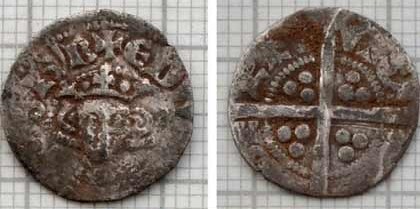
A hammered silver halfpenny coin, minted by Edward I after he came to power in 1272, has been discovered by a pair of nine-year-olds trowelling mud near the ruins of one of the most strategically important castles which chaged hands around the time the Anglo-Scottish Battle of Flodden two and a half centuries later.
Working in cold, wet morning conditions, two boys from the Scottish Borders found the coin under the guidance of organisers behind a £1.3 million project which will create an ecomuseum near the medieval Wark Castle in Northumberland.
"We found lots of medieval pottery, animal bones and, at the very end of the morning, the coin,” says Jane Miller, an Education Officer for the Flodden 1513 museum, whose experts have helped eager children and volunteers investigate an area briefly captured by James IV’s Scottish army in 1513.
“This exciting find was the icing on the cake.”
The first king to mint halfpennies, Edward I reigned from 1239 to 1307 and was known as Longshanks because of his height. He was also called the Hammer of the Scots due to his involvement in the Scottish succession, when he decided the competing claims of John Balliol and Robert Bruce to the Scottish Crown.
To read the complete article, see:
Archaeologists find King's hammered coin at site of Anglo-Scottish conflict which was last medieval battle on British soil
(www.culture24.org.uk/history-and-heritage/archaeology/art528492-archaeologists-find-king-hammered-coin-at-site-of-anglo-scottish-conflict-which-was-last-medieval-battle-on-british-soil)
THE ELUSIVE UNTOUCHED ROMAN BRONZE COINS
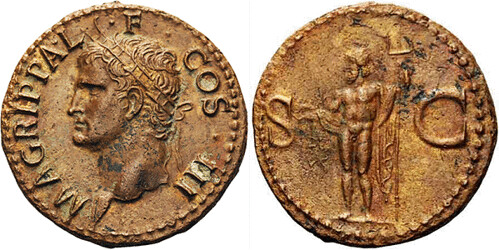
it is hard to find authentic coins in a state of preservation that really means a ‘natural’ bronze Roman coin. (Just washed to take away the earth or mud or clay) With Gold or Silver it is far easier – here we only need to be careful about whether the coin is genuine.
Over the last 50 years as I remember Gold and Silver were plentiful in the trays at Leu Numismatics in Switzerland. Bronze choice pieces were always in a small box in the back office tucked away. Although these bronzes coins were struck in vast quantities and used by the ‘plebeian of the Roman Empire’ by the millions they were the most difficult coins to find in wonderful condition. These Bronze coins could not be enjoyed by everybody as quality pieces in a wonderful state of preservation were always very rare. This story of availability was the same everywhere, Ed Wadel, Spinks, Herb Kindler kept such pieces in a small black box and the list of dealers goes on.
A Roman Bronze in wonderful condition is a piece of miniature art from the early time of the Imperial Roman Empire. These Sestertii, Dupondius and As are creating more and more interest from collectors. These Bronze pieces compared to Gold & Silver are a ‘wonder’ in themselves to have survived 2000 years, being in a base metal that readily reacts with the elements in the Earth’s atmosphere and chemicals in the earth. This is truly a miracle.
A few years ago, I had a discussion with the late Dr. Leo Mildenberg of Leu who was my mentor with reference to Roman Bronzes and considering what happened in the past and what is for discussion in the future. During the last 100+ years there has seen a changes in fashion in the early Roman Bronze coins. Until +/- 1900 most bronzes were acquired by collectors and institutions were natural coins found in the earth, washed and brushed and put in their trays. 1900-1920 saw the change to coins having their fields ‘smoothed’ to enhance the portrait and the portraits ‘tooled/re-engraved, smoothed’ to meet the collector who loved to know it was from Roman Imperial period and wanted a good looking coin.
A hoard/collection as the Bolsena with 4’000 Roman Imperial coins came to the market in 1906 in untouched condition gave a great opportunity to create these changes. Then up to late 1980’s it was a sleepy market that was woken up in the 80’s with tooling & smoothing of bronzes from places like Bulgaria took place ruining so many coins and it has carried on until today to meet the high demand for attractive bronze coins.
To read the complete article, see:
Natural Untouched Imperial Roman
Bronze Coins (www.coinweek.com/education/coin-grading/natural-untouched-imperial-roman-bronze-coins/)

DETROIT DOCTOR COULD FORFEIT $MILLION COIN TROVE
A West Bloomfield neurologist who reaped millions by allegedly cheating Medicare spent more than $9.3 million on baseball cards, ancient coins, collectable currency and stamps — a rare collection he could soon lose to the government.
Dr. Gavin Awerbuch amassed the collection — including coins from ancient Rome — using cash generated by an alleged five-year crime wave, according to federal court records that offer rare insight into the secretive world of coin collecting. At the upper end, the world is filled with hobbyists who, due to security concerns, protect the scope and value of their prized possessions.
"This flabbergasts me. I never knew that his firepower extended that far," said Metro Detroit currency dealer Frederick Bart, who sold the doctor $360,225 worth of collectable currency printed before 1928. "He didn't have a target on his back where you thought 'here comes moneybags.' "
Federal prosecutors want the collection — experts say it could be among the richest in Michigan — forfeited to the government, along with $2.9 million in cash and a million-dollar Arizona vacation home.
Though court records do not specify exactly which collectible items Awerbuch purchased, the extent of his coin collection is emerging more than one year after he was charged with health care fraud and distribution of controlled substances.
He was accused of defrauding Medicare of $7 million and prescribing so much of the cancer painkiller Subsys that he was the top dispenser in the country, according to the U.S. Attorney's Office.
"(Sizable) purchases were made with dealers of rare and collectible coins, as well as dealers of other types of collectible items," Assistant U.S. Attorney Jonathan Grey wrote in a court filing. "These assets were purchased, at least in part, with criminally derived proceeds commingled in Awerbuch's various accounts."
From 2008 through 2013, Awerbuch spent $9,343,527 at more than a dozen coin and collectible dealers in Michigan and across the country, according to court records.
The bulk, $7 million, was spent at Kagin's Inc. The California firm deals in rare coins, such as a pioneer gold coin for $999,999 and the first coin struck in North America, a shilling priced at $299,500.
"He was a good client," company President Donald Kagin told The News this week. "Over the years, we've had good transactions with him with different types of coins."
Kagin would not reveal what Awerbuch bought from his store, citing client confidentiality.
To read the complete article, see:
Detroit area doctor could forfeit coin
trove worth millions in fraud case (www.detroitnews.com/story/news/local/oakland-county/2015/06/17/rare-coins/28902899/)
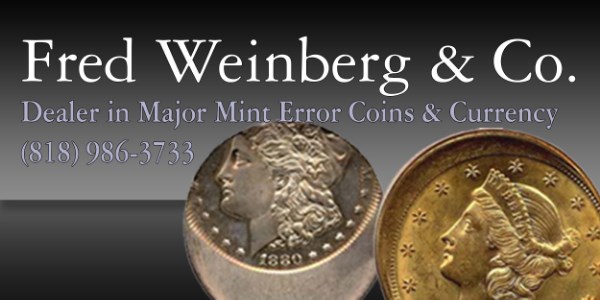
FEATURED WEB SITE: FRENCH TOKEN COLLECTORS ASSOCIATION
This week's Featured Web Site is the Association des Collectioneurs de Jetons-Monnaie (CJM) of France (the French token collectors association). Suggested by Yosef Sa'ar, he writes:No less than four publications are shown. Sadly, I had never heard of any of them.

www.acjm.fr
